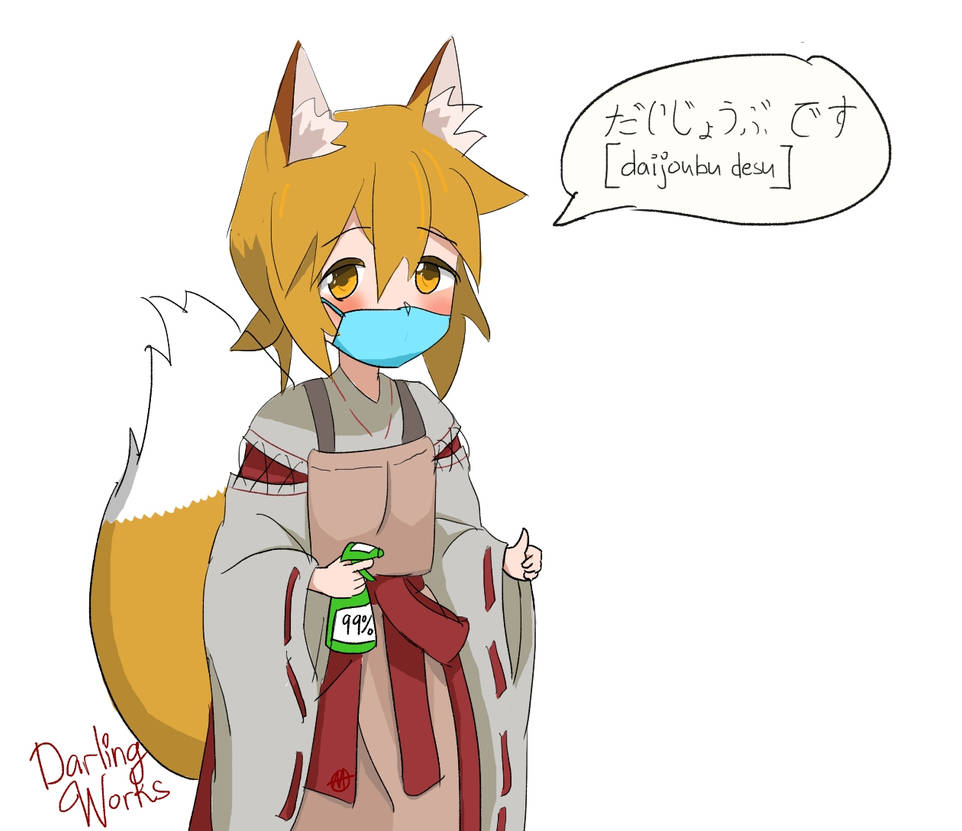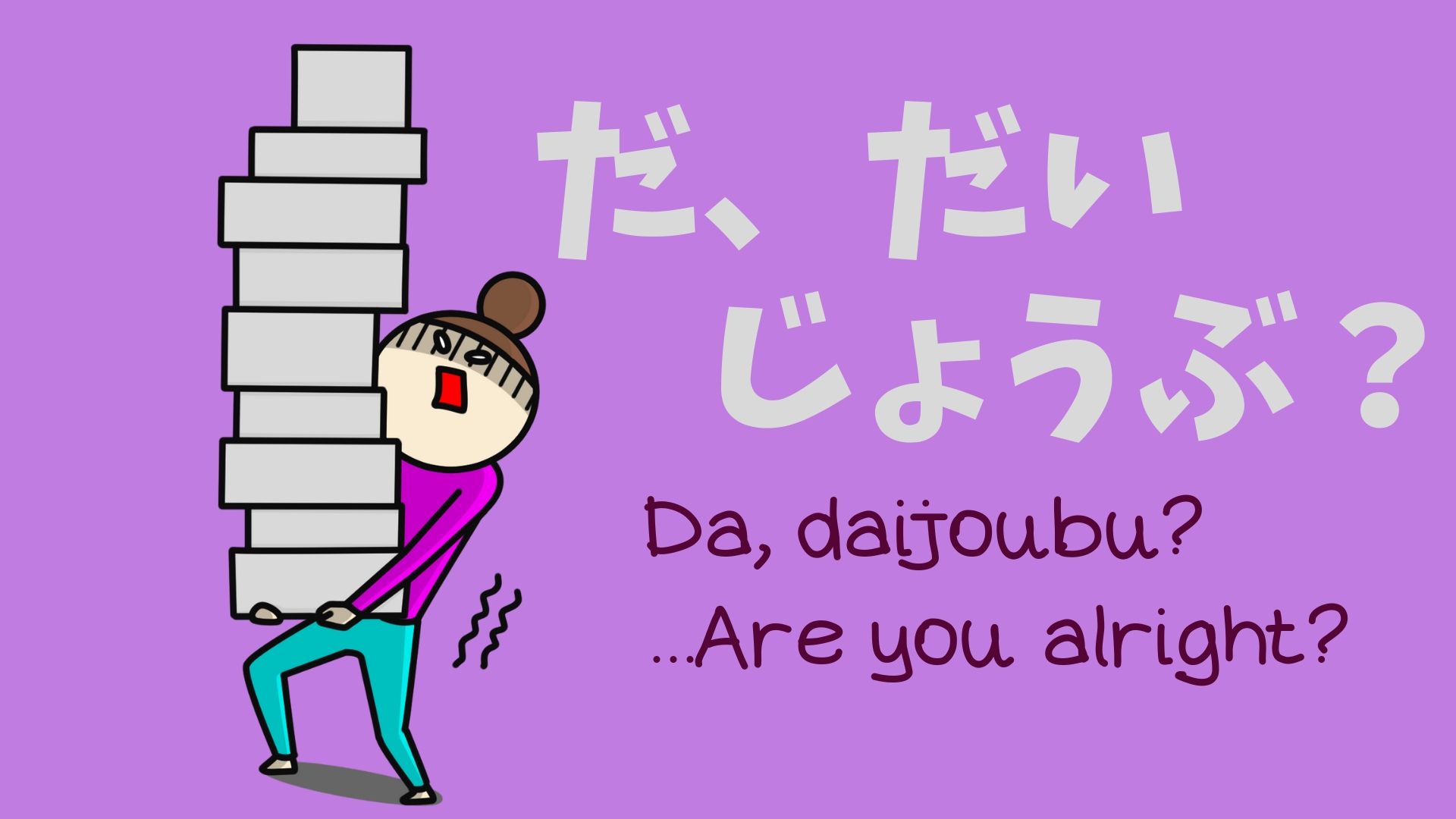
Daijoubu desu ka? by Kaibonsen on DeviantArt
Chapter Two: Explanation. だいじょうぶ です か?. daijoubu desu ka? - [Are you ok?] As we discussed in Chapter 1, adding a か ka. to the end of a sentence makes it a question. Without the. ka this would mean, " (I) am fine.". daijoubu can mean "fine,ok, good, safe…".

Daijoubu desu ka? r/Underrated_GuP
When someone asks you DAIJOBU DESU KA?, you can reply DAIJOBU DESU. That will let the person know you're OK. Some Japanese restaurants expect you to take off your shoes when you go in, but.

Moshi Mosh, Daijoubu Desu Ka? Shinobu Demon Slayer (Kimetsu No Yaiba) YouTube
Daijoubu desu (大丈夫です / だいじょうぶです) is perhaps the most popular, polite phrase meaning 'It's/I'm okay' or 'It's alright' in Japanese. It's a very handy expression for many situations. When someone asks daijoubu desu ka (大丈夫ですか), it can mean any of the following: Is this okay (with you)? Are you okay? How are you?

Daijoubu desu datte kimi yowai mo YouTube
Daijoubu is pronounced as "dhai - jo - bu". The "D" in Daijoubu mustn't be emphasized and should be rather pronounced with a light sound like "dhai". The "Jou" in Daijoubu is actually pronounced as "jo" because the "U" is silent and it should not be pronounced as "jou" or "jow".

Daijoubu desu ka? by markjasonpascual77 on DeviantArt
The amount of [not okay-ness] keeps on multiplying like crazy and I'm worrying for you all. [大丈夫じゃなさ]が滅茶苦茶増えてるって皆さん心配しておられます. [daijoubu janasa] ga mechakucha fueteru tte mina-san shinpai shite oraremasu. The amount of [not okay-ness] keeps on multiplying like crazy and I'm worrying.

Daijoubu desu ka ? YouTube
Daijoubu desu ka? 大丈夫ですか? Are you alright? Daijoubu (大丈夫 / だいじょうぶ) can translate to 'okay' or 'alright' and is one of the most useful words to know in Japanese. It can be used in a few different scenarios.

Daijoubu desu ka? YouTube
5.1 Good. 5.2 So-So. 5.3 Not Good. 5.4 Thank You for Your Concern. 6 Other Basic Greetings in the Japanese Language. 6.1 Standard Form. 6.2 Informal and Abbreviated Form. 6.3 Casual and Easy-Going Form. 7 "How Are You" in Japanese and The Gifting Customs.

DAIJOUBU DESU KA YouTube
Daijōbu is a Japanese phrase that encompasses a few meanings. It can be taken as either a "yes" in certain situations, or a "no" in an entirely different one! Little wonder, then, that many foreigners find themselves perplexed about how exactly to approach this useful phrase. By educating yourself beforehand about the variety of situations this phrase can be used in, however, you'll.

Daijoubu desu ka? by Athirae on DeviantArt
丈 (zhang) - literally translates to mean man or husband in English. 夫 (fu) - literally translates to mean height, length, or stature in English. The Different Forms of Japanese Speech and Their Effects On The Definition & Meaning of Daijoubu and other Phrases Daijoubu Desu Ka - Is It Ok / Are You Ok Daijoubu Desu / Daijoubu Dayo - I Am Ok

Daijoubu desu ka by Matsusensei on DeviantArt
Using 元気 to Ask How Are You. One of the first phrases that every Japanese learner comes across is the following. お元気ですか?. ogenki desu ka? How are you? The word 元気 (genki) means "full of spirit; in good health" and is used to refer to both a person's mental well-being and their physical well-being.

Daijoubu Desu Ka Japan 24 Hours
What is Daijoubu desu ? This phrase is written in Japanese using the kanji: "大" (dai) meaning big, 丈 (jo) meaning height or height, and 夫 (bu) meaning husband. The three kanji represent "strong man," 大丈夫, but over time their meaning has completely changed.

Daijoubu Desu Ka Meaning in English AnnabellaminAguilar
04/03/2020 Japanese often use the word "daijoubu(だいじょうぶ、大丈夫)". Most Japanese use the word not only in casual settings but also in formal settings. It is used so often, and recently its usage has changed slightly because it can have many different meanings.

How to use Daijoubu Desu in Japanese YouTube
"Daijoubu" is a phrase usually written in kanji "大丈夫", the hiragana form of which is "だいじょうぶ". Depending on the context, this interesting phrase has various meanings that may be beyond your thoughts. The Etymology of Daijoubu The Japanese word for "the origin of a word/phrase" is 語源 (gogen).

Shinobu Kocho 'Moshi moshi daijoubu desu ka' lofi remix ringtone with download link YouTube
Daijoubu desu ka (大丈夫ですか): A formal way to ask, "Is everything okay?" Daijoubu desu (大丈夫です): A polite response, often meaning "It's alright" or "No problem." Daijoubu da to omaimasu: Translates to "I believe it will be fine." Daijoubu kara: Implies "Because it's okay."

Daijoubu desu ka(大丈夫ですか HD) YouTube
1. If you fall down / you injure yourself - you can let people know that you are fine by exclaiming 大丈夫です - Daijobu desu (I'm okay!) Polite/ Formal 大丈夫 - Daijobu (I'm okay!) - Casual / Informal 2. You can ask someone else if they alright after a fall. 大丈夫です か ? Daijobu desu ka? - (Are you alright?) 3.

Daijoubu Desu Ka Japan 24 Hours
1. Daijoubu - Asking if Someone Is Okay Japanese textbooks often say that " daijoubu" is used when asking or stating whether one is okay or not. For example, if two friends are eating in a café and one of them chokes on food, they would both end up using daijoubu. Mary: "Are you okay?" - 大丈夫ですか? ( Daijoubu desu ka?) Jane: "Yeah, I'm fine."